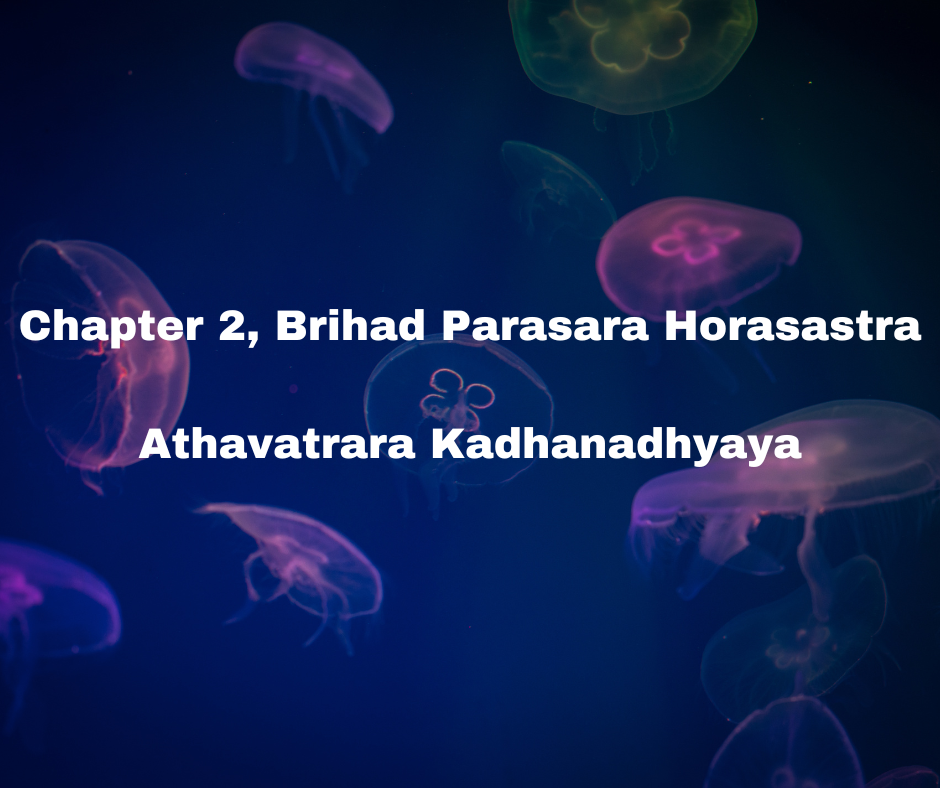Ch:2 Brihad Parasara Hora Sastra , Athavatrara Kadhanadhyaya
Athavatrara Kadhanadhyaya
The name of the chapter is The Great Incarnations of Lord Vishnu. In the beginning of this chapter, Sage Maitreya is asking Sage Parasara to describe whether Lord Vishnu, Shree Rama, and Shree Krishna are endowed with Jeevamsa.

In the first chapter, there is no mention of “Jeevamsa” as a word, but it means five elements in nature.
Firstly, there are many schools of thought in Hindu tradition, but being a monotheist, what I believe is God himself as all the goodness and bad things. As a monotheist, I would say, don’t fall into the trap of various theories about God, as God is a simple concept as well as reality, as God created everything. From he comes the good and evil, if someone says God created good things and someone else created bad things, which is ultimately foolish, as God itself is the reason for everything. God created flowers; they themselves ignite people to rape. It’s very simple; our duty is to choose what we have to do.
Jeevamsa is a vast topic, yet it can be simplified as more human-like nature. For Sage Maitreya’s question, Sage Parasara says that out of the great incarnations of Vishnu, Ram, Krishna, and Varaha are fully godly, and they are filled with paramatma, but the rest of the incarnations have dominant jeevamsa. When we read this chapter, we should realize that Sage Parasara is a monotheist who ardently follows Vishnu. Out of his admiration for Vishnu, he has recited the Vishnu Purana.
Jeevamsa and Paramatmanas
These are the two highlights of this chapter, and only those deeply connected to any kind of theology can understand these terms. Jeevamsa means that part of our life that is required to live on this earth, while Paramatmanas is the supreme spirit that is within us or surrounds us and is indestructible.
Shloka 3–4 has a word, which is unborn Lord. This shloka will take us to the battle ground of Kurukshetra, which is mentioned in Bhagavad Gita Chapter 4. Jnana Yoga
In this chapter of the 5th shloka, Lord Krisha says that he is unborn. That means he never takes birth or dies; that means Lord Vishnu, who is the ultimate god, is eternal without birth or death.
Sage Parasara continues, as Lord Vishnu himself is the force behind all the creations, including the grahas. The ones with more paramatmanas are known as heavenly beings.
The ending paragraph says that people with more Jeevatma are mortals, and those with more paramatmanas reincarnate from various grahas, and after completing the mission on earth, they will merge back into the grahas. At the end of the final destruction, all grahas will merge into Lord Vishnu. Again, Sage Parasara says, only divine people can understand these, and those who know them will become well versed in the past, present, and future. In the last sentence, Sage Parasara says those who don’t acknowledge this science will go to hell named ‘Raurava’ and be reborn as blind.
In this chapter, too, he doesn’t say anything about creation.
